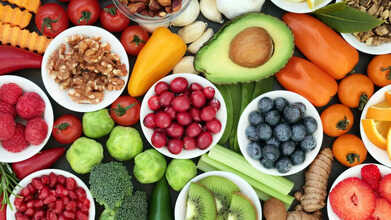- Health Conditions A-Z
- Health & Wellness
- Nutrition
- Fitness
- Health News
- Ayurveda
- Videos
- Medicine A-Z
- Parenting
Kennedy's MAHA Report Will Not Solve Food Problem In US, Here's What Experts Believe

Credits: Canva
Food policy experts had cautiously hoped that the new health secretary, Robert F. Kennedy Jr., might finally address the nation’s poor diet and reduce reliance on ultraprocessed foods. But many expressed disappointment following Tuesday’s White House report detailing the Make America Healthy Again (MAHA) commission’s plans to tackle childhood chronic disease.
While the report includes promising initiatives such as offering healthier meals in schools and promoting breastfeeding, it remains vague about how these policies would be implemented or funded. The New York Times quoted Kelly Brownell, professor emeritus at Duke University’s Sanford School of Public Policy, saying, “Even if all of the initiatives in the report were put into action, the industry will not be required to change how it manipulates and markets foods that drive poor health in children.”
Contrast With Previous Report
The new report contrasts sharply with MAHA’s first report in May, which focused on identifying drivers of poor health in American children. Jerold Mande, adjunct professor of nutrition at Harvard T.H. Chan School of Public Health and former federal food policymaker, described the initial report as “revolutionary in its focus” on ultraprocessed foods and the companies producing them.
“[The new report] seems more in line with food industry interests than the previous one, as if it was written to just maintain the status quo,” Mr. Mande told The New York Times. Ultraprocessed foods were mentioned only a few times, primarily in describing efforts to define them.
Industry Response
Following the report’s release, industry groups largely welcomed its recommendations. The Food Industry Association, representing producers and retailers, issued a statement of support, and the Consumer Brands Association called it “a very ambitious” set of policy recommendations it would help implement, The New York Times reported.
The report also permits schools and federal nutrition programs to offer whole milk instead of just lower-fat options, a change long supported by the dairy industry. Marion Nestle, professor emerita of nutrition and public health at New York University, highlighted this as a key example of industry-favored policy.
Limits of Voluntary Industry Cooperation
So far, Mr. Kennedy has relied on voluntary cooperation from the food industry rather than mandating change. This approach has succeeded in some areas, such as reducing artificial dyes in foods. However, experts note that larger drivers of ultraprocessed food consumption, low cost, heavy marketing, and high fat, sugar, and salt content, are unlikely to be addressed without regulation.
Christina Roberto, director of the Center for Food and Nutrition Policy at the University of Pennsylvania, told The New York Times, “The issues they’re focused on for food and nutrition are really spot on. But the devil is completely in the details.” She added that policies like sugary drink taxes, which have proven effective in other countries, could reduce consumption and improve health outcomes.
Support for Some Proposals, Gaps in Regulation
The report also lists measures that policy experts support, such as expanding research on nutrition, improving hospital and federal program meals, scrutinizing food additives, and closing the longstanding “GRAS loophole” that allows companies to introduce new chemicals without FDA approval.
Yet, experts said the report lacks clarity on how the FDA would increase oversight, particularly amid staffing and funding cuts. Jennifer Pomeranz, associate professor of public health policy at NYU, told The New York Times that even if additives like artificial dyes are removed, foods could remain high in sugar, sodium, and fat.
A draft version obtained by The New York Times in August proposed “ways to lower added sugar and sodium in packaged foods,” a line removed from the final report. “You assume that food industry lobbying got that taken out,” Dr. Nestle said. She also criticized vague language suggesting that companies would police themselves to limit marketing unhealthy foods to children.
Longstanding Challenges Remain
Experts noted a tension between the administration’s stated goal of improving public health and its actions, such as cuts to SNAP benefits and the elimination of large-scale nutrition education programs. Many see the report as similar to past administrations’ efforts: a list of reasonable proposals without strong enforcement mechanisms.
“Administration after administration, independent of the political party, has been unwilling to tackle the food industry,” Dr. Brownell told The New York Times. “As long as the industry isn’t required to change, it won’t.”
Do Healthy Foods Contain Microplastics? Ways To Reduce Your Intake

Credits: Canva
Many people are now aware that microplastics have entered the food and drink we consume every day. Seafood, in particular, has been widely discussed, as studies have found plastic particles in nearly all samples of fish and shellfish tested.
How Plastic Pollution Turned Into A Food Problem
Plastic production has been rising steadily since the 1960s, with around eight million metric tonnes entering the oceans each year. Over time, sunlight and wave action break this waste down into microplastics, tiny fragments measuring less than five millimetres. These particles persist in the environment and gradually move through the food chain.
It Is Not Just Seafood, Experts Warn
Writing in The Conversation, environmental expert Catherine Rolph explains that while seafood has received most of the attention, it is far from the only source of exposure. Public awareness is growing, she notes, but microplastics are found in many everyday foods, often in higher amounts than people expect.
Chewing Gum
Chewing gum is one of the more surprising sources of microplastics. Most gum is made from a synthetic base containing plastics and rubber, along with added sweeteners and flavours. As the gum is chewed, microplastic particles are released. Research suggests that just one gram of gum can release hundreds of these particles.
Even gums labelled as natural appear to release similar amounts, which points to contamination during production or packaging. Studies also show that most microplastics are released within the first few minutes of chewing.
Salt
Salt may seem like a basic, natural ingredient, but studies show that microplastics are present in the vast majority of salt products tested worldwide. In fact, contamination has been found to be higher in some land-based salts, such as Himalayan salt, than in sea salt.
Experts believe much of this contamination occurs during processing and packaging. Plastic grinders can also add to the problem by releasing additional particles while grinding.
Apples and Carrots
Microplastics have been detected in a wide range of fruits and vegetables. Very small plastic particles can enter plants through their roots, while larger fragments may settle on their surfaces.
Research has found that apples and carrots tend to contain higher levels compared to other produce, while leafy greens such as lettuce show lower contamination. Despite this, experts stress that the health benefits of fruits and vegetables remain far greater than the potential risks.
Tea And Coffee
Hot drinks are another overlooked source of microplastic exposure. Tea leaves, coffee, milk, and disposable takeaway cups can all contribute to contamination. Heat increases the release of microplastics, which is why hot beverages often contain more particles than cold drinks. Using loose-leaf tea and reusable cups made from glass or metal can help reduce exposure.
Seafood
While most seafood does contain microplastics, studies suggest the actual levels are often lower than people assume. Filter-feeding shellfish such as mussels have been found to contain relatively small amounts compared to some processed foods and drinks prepared using plastic materials.
What You Can Do to Cut Your Intake
Experts say completely avoiding microplastics is unlikely, but small changes can help reduce exposure. Storing food in glass containers, avoiding plastic packaging where possible, and using non-plastic grinders and utensils can make a difference.
Switching from bottled water to tap water may also lower intake, as studies suggest single-use plastic bottles release more microplastics than tap water.
Drinking Water Is Even More Important During Winters, According To Doctor

Credits: iStock
As a harsh cold wave swept across North India, doctors noticed a quiet but worrying trend inside emergency rooms—more people were showing up dehydrated, even though temperatures were at their lowest. Health and Me spoke to Dr. Swadesh Kumar, Cluster Head – Emergency and Trauma Care & Casualty, Gurugram, to understand why winter dehydration is often missed and how it can turn dangerous if ignored.
When Cold Weather Creates a False Sense of Safety
Winter is usually associated with hot drinks, cozy layers and fewer reminders to sip water. According to Dr. Kumar, this mindset is exactly where the problem begins. “People assume that because they’re not sweating or feeling thirsty, their body doesn’t need as much water. That’s a misconception,” he explains.
During cold spells, thirst signals are naturally suppressed. At the same time, the body continues to lose fluids through dry air, indoor heating and even breathing. “The loss is gradual and silent, which makes winter dehydration harder to spot,” Dr. Kumar adds.
A Rise in Winter Emergency Cases
Hospitals across northern states reported a seasonal increase in dehydration-related complications during the cold wave. These weren’t always dramatic cases. Patients often came in with dizziness, fatigue, confusion or sudden changes in blood pressure.
“In many emergency visits, dehydration wasn’t suspected initially because there was no heat exposure or fever,” says Dr. Kumar. This delay allowed symptoms to worsen before treatment was started.
How Dehydration Worsens Existing Conditions
Low fluid intake doesn’t just cause weakness, it can aggravate underlying health problems. When the body is dehydrated, blood becomes thicker, increasing the risk of clot formation. This is particularly dangerous for older adults and people with heart disease.
Kidneys are also affected. Reduced hydration puts extra strain on them, sometimes leading to acute kidney injury. “We see patients with palpitations, fainting spells and extreme weakness, only to later realize dehydration is the root cause,” Dr. Kumar notes.
Respiratory Infections Add to the Risk
Winter illnesses further complicate the situation. Fever, rapid breathing and certain medications increase fluid loss. Yet many people intentionally avoid drinking water to reduce bathroom visits in the cold.
“This combination is especially risky for children and the elderly,” Dr. Kumar says. Children depend on caregivers for hydration reminders, while older adults naturally feel less thirsty. Both groups can slip into dehydration quickly during winter infections.
Indoor Heating: The Hidden Culprit
Room heaters and blowers dry out indoor air, leading to unnoticed moisture loss through the skin and breath. People spending long hours indoors often underestimate this effect.
Early signs like dry lips, headaches and muscle cramps are commonly ignored. By the time medical help is sought, dehydration may already have disrupted blood pressure or electrolyte balance.
Subtle Warning Signs Often Missed
Unlike summer dehydration, winter dehydration doesn’t come with intense thirst. Dark urine, reduced urination, constant tiredness and mild confusion are frequent clues but are often blamed on cold weather or poor sleep.
“In severe cases, dehydration can contribute to sudden falls, worsening chronic illnesses and emergency admissions,” Dr. Kumar warns.
Simple Habits Can Prevent Serious Risk
Doctors advise treating hydration as a routine, not a response to thirst. Warm water, soups, stews and herbal drinks are practical winter options. Fruits with high water content also help, even when appetite is low.
“Monitor urine color, limit excess caffeine and be extra careful if you have a chronic condition,” Dr. Kumar advises.
The cold wave is a reminder that dehydration isn’t just a summer problem. Even in winter, the body needs adequate water to function, and ignoring that need can quietly turn into a medical emergency.
8 Natural Ingredients That Work Like Weight Loss Jabs Without Side Effects

Credits: Canva
With 28 percent of adults in the UK now classified as obese and another 36 percent considered overweight, it is unsurprising that weight-loss injections have surged in popularity. Estimates suggest around 1.5 million people are currently using these jabs each month.
While the injections can lead to significant weight loss, experts warn that they come with notable risks and often fail to address the root causes of weight gain. Mike Wakeman, a researcher, pharmacist, and founder of Evera Nutrition, explained how these medications work and why they may fall short in the long term.
“These medicines mainly act by increasing two gut hormones, GLP-1 and GIP. These hormones reduce appetite, increase feelings of fullness, and slow stomach emptying,” he said. “The problem is that many people rely on medication alone.”
Why Weight-Loss Jabs May Not Solve the Problem
Wakeman pointed out that several underlying contributors to weight gain are frequently overlooked. “Stress, poor sleep, alcohol misuse, binge eating, and even certain medications or hormonal and medical conditions, such as an underactive thyroid, are often ignored when discussing weight issues,” he said. “If these factors are not addressed, they will still be present at the end of treatment and are likely to trigger weight regain.”
Recent research supports this concern. Studies have found that participants regained almost all of the weight they lost within a year of stopping weight-loss injections.
Weight Loss Jabs Side Effects and Long-Term Risks
Side effects linked to weight-loss jabs are common and include nausea, vomiting, constipation, and acid reflux. More serious health issues have also been reported in some individuals. These include pancreatitis, gallbladder problems, and depression. Rapid weight loss can result in muscle loss, while hair thinning and vision problems have also been associated with the use of these injections.
Natural Ingredients That Work Like Weight Loss Jabs Without Side Effects
According to specialists, growing scientific evidence suggests that certain natural ingredients may help support healthy weight loss when combined with proper diet and lifestyle changes, without the same side-effect profile seen with injections.
“The good news is that some natural ingredients can mimic the effects of GLP-1,” Mike said. “These include glucomannan, which is a type of fibre, along with resveratrol, hibiscus, green tea, berberine, curcumin, cinnamon, and mulberry.”
Ingredients That Act Like ‘Natural Weight-Loss Jabs’
Explaining the science behind these ingredients, Wakeman broke down how each one may support weight management.
“Glucomannan is a natural fibre derived from the konjac root. It expands in the gut, helping you feel full, and may also increase GLP-1 levels,” he said, as per Mirror. “Resveratrol, found in foods such as grapes, has been shown to significantly reduce body weight, waist circumference, and BMI.”
“Hibiscus has been shown to reduce obesity, abdominal fat, and blood lipid levels,” he added. “Catechins like EGCG, found in green tea, have been linked to meaningful reductions in body weight, BMI, and waist circumference, particularly at higher doses and over longer periods, when combined with a healthy diet and exercise. They also help boost metabolism and fat burning.”
“Berberine is a plant compound that, according to a meta-analysis of 12 studies, reduces body weight, BMI, and waist circumference,” he said. “Curcumin, the active compound in turmeric, has also shown strong evidence. An umbrella meta-analysis covering 14 systematic reviews and 39 randomised controlled trials found that curcumin supplementation reduces body weight, BMI, and waist size, while also improving blood sugar and blood fat levels.”
“Cinnamon may help reduce weight by improving blood sugar control,” Wakeman continued. “A meta-analysis of 12 trials involving 734 people found that cinnamon intake lowered body weight, BMI, and waist circumference. Mulberry has also shown anti-obesity effects, including activating brown fat.”
How Some Ingredients May Boost GLP-1 Further
Wakeman also noted that certain ingredients may work by slowing the breakdown of GLP-1 and GIP. “Some compounds may help inhibit Dipeptidyl Peptidase-4, or DPP-4,” he said. “DPP-4 is an enzyme that breaks down GLP-1 and GIP. When this enzyme is blocked, these hormones remain active for longer.”
Ingredients that may play a role in DPP-4 inhibition include curcumin, resveratrol, cinnamon, maritime pine bark extract, blackcurrant, mulberry, quercetin, and rosemary.
© 2024 Bennett, Coleman & Company Limited

